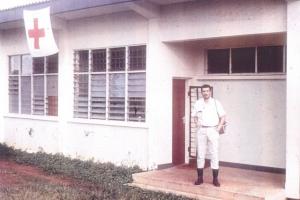Dragan Hercog was born in the village of Banatsko Karadjordjevo, Vojvodina, in the former Yugoslavia, on 8 July 1936. His father Andrija was a doctor and his mother Jelena, a teacher. During the Second World War, his father was arrested and imprisoned in Belgrade’s notorious Topovske Supe concentration camp where he was killed in October 1941. When the war ended, Dragan, his mother and younger sister Verica moved to Belgrade. After finishing school, Dragan followed in his father’s footsteps and enrolled in medical school. He graduated from the University of Belgrade’s Faculty of Medicine in 1962 and became a surgeon at the city’s Dr Dragisa Misovic Hospital. He later married Jelena Obradovic, an English teacher.
In August 1968 Dragan answered an appeal from the Yugoslav Red Cross and the ICRC for volunteers to go to Biafra, which had declared independence from Nigeria the previous year, sparking a brutal civil war and humanitarian crisis. Dragan knew that with his skills and knowledge he could save the lives of many sick and wounded. The mission was intense: Dragan worked 16-hour days in the operating theatre at Okigwi State Hospital, around 45 kilometres north of Umuahia.
On 30 September, as fighting neared the town, the Yugoslav surgical team ordered the evacuation of some 200 hospital patients. However, Dragan and his colleagues remained, knowing that their work was not done. The area around the hospital was immediately declared a “neutral zone”, with signs displaying the red cross emblem placed along paths leading to the hospital, on the roof and on all the doors. Members of a Swedish Red Cross aid team, also seconded to the ICRC, helped their Yugoslav colleagues build two shelters, where they were joined by two British missionaries from the World Council of Churches, the Reverend Albert Savory and his wife Marjorie. Later that afternoon, as they came outside during a lull in the fighting, firing broke out. Dragan, who was 32, was killed along with Robert Carlsson, a member of the Swedish aid team, and the two missionaries. Another member of the Swedish team was injured.
Dragan’s funeral took place in Belgrade on 11 October. His coffin, draped with a Red Cross flag, was escorted by young National Society volunteers. Several thousand people attended. He was buried in the city’s New Cemetery where a sculpture by Holocaust survivor Nandor Glid stands over his grave. The following year, Dragan and Robert Carlsson were among the first-ever recipients of the Henry Dunant Medal. In 1971 Belgrade’s authorities named a primary school after Dragan that specializes in teaching children in extended home or hospital care.
